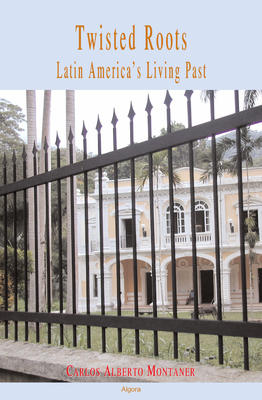
Sound Bite
A popular Spanish journalist and author examines the historical and cultural influences that shaped Latin America and suggests that they have made it into the most impoverished, unstable and backward region in the Western world.
About the Author
Syndicated columnist and novelist Carlos Alberto Montaner is a frequent lecturer and part-time instructor at the University of Miami (FL), the University of Guatemala, and others. Born in Cuba, Montaner has lived in Madrid since 1970. Dozens of newspapers in the U.S., Spain and Latin American run his weekly column. He has published two books with Algora Publishing. His books in Spanish include Fidel Castro y la Revolución cubana, No Perdamos tambien el siglo XXI (Let's Not Lose the 21st Century Too), the novels Perromundo and Trama, and, in collaboration with Plinio Apuleyo Mendoza and Alvaro Vargas Llosa, Manual del perfecto idiota latinoamericano and Fabricantes de miseria.
|
|
About the Book
No one ever saw what happened in Latin America as legitimate or just -- including the descendants of the Conquistadors themselves, says Montaner. Today's patent economic failure, political instability and poor scientific...
No one ever saw what happened in Latin America as legitimate or just -- including the descendants of the Conquistadors themselves, says Montaner. Today's patent economic failure, political instability and poor scientific contribution stem greatly from this unique history. Spaniards, Creoles, Indians and Blacks all have their own aggrieved perspectives, and all are partly justified. Montaner draws on the cultural and historical currents that made up Spain at the time of the Conquest, including the Gothic, Moorish, Christian and Jewish elements; and explores how Spain tackled the challenge of co-opting, rather than exterminating, the native peoples. A more humane approach than that undertaken in North America, it nonetheless laid the foundations for the long-lasting conflict and confusion that still make Latin America unruly today. Contents: A Suspicious Origin: Fraud, Sophism and Other Theological and Judicial Traps One State to the Dissatisfaction of All Blacks in a Persistently Racist Society Sex, Sexism and Gender Roles An Economy Twisted at Birth "Let Others Invent!" Caudillos, Montoneros, Guerillas, and Liberals and Conservative An Escape from the Labyrinth Bibliography Index
|
Why is Latin America the poorest and most underdeveloped region in the West? Let us go straight to the heart of the matter: this book is based on the painful hypothesis that Latin America's patent economic failure, political instability and poor scientific contribution stem greatly from its unique history. This is a history that, from its...
Why is Latin America the poorest and most underdeveloped region in the West? Let us go straight to the heart of the matter: this book is based on the painful hypothesis that Latin America's patent economic failure, political instability and poor scientific contribution stem greatly from its unique history. This is a history that, from its inception, has been viewed as corrupt and unjust even by its protagonists ' Spaniards, Creoles, Indians, and Blacks. Each group has its own aggrieved perspective and all are partly justified. It's a history that blended the machismo of the conquerors with that of the conquered, and to this day it is brutally undermining women, the disadvantaged half of Latin America. It's a history in which the social fabric that emerged, loosely woven from assorted ethnic remnants, never managed to form a state reflecting the interests and values of the immense majority, and a history that inspired certain customs and attitudes along with a specific economic mindset that resisted the creation and preservation of wealth. A history, in short, that failed to foster scientific originality or technical inventiveness, perhaps because the people were never able to overcome the circumscribed educational framework of the culture and the repressive mechanisms that gave rise to a mindset that is resistant to progress.This book is based on a series of lectures on Latin American identity I gave at the Francisco MarroquÃ??Ã??n University of Guatemala and at the University of Miami as part of a special program directed by historian and political scientist Jaime Suchliki. These talks were open to the public, for I intended to project a historical view of Latin America useful not only to students, but also to any intelligent or merely curious person who has ever asked what was keeping Latin America down. The eighth chapter, 'Escape from the Labyrinth,' is based on the last lecture I taught at Lima's Peruvian University of Applied Sciences, at the behest of its president, former senator and noted defender of civil liberties Luis Bustamante BelaÃ??Ã??ºnde. The chapter concluded a series entitled, 'A Different History of Latin America.' This piece, the logical conclusion to my work, responds to the agonizing question derived from my previous argument: if Latin America's historical roots are rotten, is it then condemned to eternal underdevelopment, tyranny, and cultural backwardness? Or, might Latin America some day take its place among the other leaders of Western progress? Fortunately, the answer is hopeful: the 20th century has taught us, especially after World War II, that economic growth is attainable and that poverty and stunted growth are surmountable. Spain, Portugal, South Korea, Singapore and Taiwan demonstrate just that. Chile, today, is also pointing in that promising direction.
|
|
Pages 208
Year: 2003
LC Classification: F1410.M717513
Dewey code: 980'dc22
BISAC: HIS033000
Soft Cover
ISBN: 978-0-87586-260-6
Price: USD 22.95
Hard Cover
ISBN: 978-0-87586-261-3
Price: USD 26.95
Ebook
ISBN: 978-0-87586-203-3
Price: USD 26.95
|













